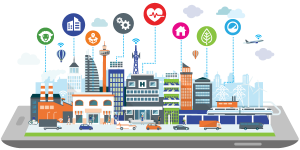This post is also available in: Español (Spanish) English

Alguns serveis municipals es poden convertir en serveis d’Internet de les Coses (#IoT) a través d’una xarxa oberta com la que proposem des de la XOIC, i així ho hem explicat a l’Altra Ràdio.
Una xarxa oberta permet compartir infraestructura entre diferents proveïdors i per a diferents usos. D’aquesta manera, defugint despeses en llicències privatives i assegurant el retorn de la inversió, el consistori pot digitalitzar serveis i procediments, però també posar en marxa tot de noves polítiques de monitoratge i control de recursos municipals creant un bessó digital d’allò que passa al territori.
Recentment, el terme bessó digital s’està posant de moda i l’entenem com el model digital on podem consultar els paràmetres del món físic. Per a un ajuntament això vol dir que pot tenir coneixement de forma remota i emmagatzemat de tot el que és mesurable al seu municipi.
Què podem mesurar?
Entre els serveis que podem digitalitzar trobem el control de l’aigua boca (el nivell dels pous, la distribució i el seu consum) com explicàvem en l’última intervenció en l’Altra Ràdio, recollida en el post sobre gestió de l’aigua. També es pot fer el control del reg a parcs i jardins de forma remota i supeditada a mètriques com la humitat del terreny, el nivell dels dipòsits o fins i tot la previsió de pluges. Vigilar el confort en edificis públics o municipals en paràmetres d’humitat, temperatura, nivell de CO2 , la supervisió de la contaminació acústica/lumínica o de pol·lució ambiental, la supervisió de les rutes de les diferents flotes així com el control de la generació i despesa elèctrica entre molts altres.
L’ajuntament pot implementar tots aquests serveis sense estar lligat a cap proveïdor, pot comprar diferents equips per a un mateix servei a diferents empreses, i pot comprar equips a diferents empreses per a serveis diferents. Tampoc cal cap llicència de programari per a explotar aquests serveis perquè es disposa d’eines de programari lliure que són ja estàndards a la indústria i que permeten triar entre diferents proveïdors, i inclús autoproveir-se.
El fet de no estar lligats a cap proveïdor permet evitar costos abusius però també la malversació i corrupció, perquè es poden fer concursos públics realment oberts.
Tot això, unit a l’anonimat de la xarxa, permet que aquesta infraestructura sigui realment pública i altres persones, entitats o associacions puguin fer-ne ús sense perjudici dels serveis municipals i és del que parlarem el pròxim dia a l’Altra Ràdio.
Cal, però que algú col·loqui la primera pedra i la digitalització obligatòria de serveis i procediments municipals és la millor oportunitat per fer-ho.
Ens trobareu a l’Altra Ràdio
Escolteu la nostra intervenció al minut 42’38 del pòdcast de L’@altraradio de @radio4_rne del 19/4 a https://www.rtve.es/play/audios/laltra-radio/cirurgia-robotica-da-vinci-vall-hebron/6866493/
Des de la cooperativa participem de tots els canals a l’abast per fer difusió del procomú i sempre és un plaer anar convidats a @altraradio de @radio4_rne i arribar als seus oients.
Des de la XOIC ens agrada compartir la nostra visió d’una xarxa oberta d’Internet de les Coses (#IoT) i com a prescriptors de la tecnologia LoRaWAN-TTN (@ttncat) agraïm poder compartir idees i propostes d’una forma tan amena com en aquest programa.
En els programes on som convidats podeu escoltar-nos parlar tant de motius de base per a una xarxa oberta com d’aplicacions pràctiques i concretes per a municipis, associacions, empreses i particulars.
